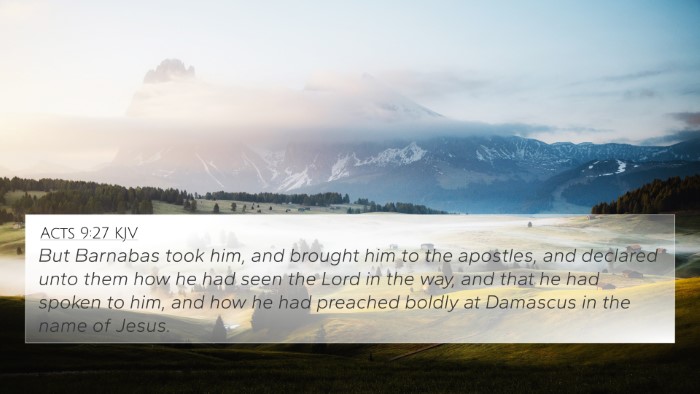Understanding Acts 11:25
Acts 11:25 states: "Then Barnabas went to Tarsus to look for Saul." This verse is a pivotal moment in the early church's expansion and highlights the intentionality behind Barnabas's actions in seeking out Saul, later known as Paul, who would become one of the most influential apostles.
Contextual Significance
This verse occurs in a period of growth for the church in Antioch. Previous verses describe how the followers of Jesus began to include Gentiles, leading to a diverse and thriving community of believers. Barnabas, a key figure in the early church, recognizes the potential of Saul and his crucial role in proclaiming the Gospel.
Commentary Insights
Combing insights from public domain commentaries enhances our understanding:
-
Matthew Henry's Commentary: Henry notes Barnabas’s dedication to the cause of Christ and how he actively sought out Saul—indicating the importance of collaboration in ministry. He emphasizes the leadership qualities of Barnabas who, sensing a divine purpose, was proactive in bringing Saul into the fold. This act symbolizes unity within the body of Christ.
-
Albert Barnes' Notes: Barnes highlights that Barnabas’s mission to find Saul underscores the necessity of mentoring and supporting new leaders in the faith. Finding Saul was not merely a search for a gifted preacher but a strategic move to build a strong foundation for the growing church in Antioch, indicating a pattern of teamwork in evangelistic efforts.
-
Adam Clarke's Commentary: Clarke points to the significance of Barnabas’s journey to Tarsus as an expression of faith. He suggests that this search was driven by a belief in the transformative power of God, and Barnabas’s faith in Saul’s ability to contribute to the ministry was vital. This act of reaching out is a lesson in embracing and nurturing potential leaders.
Related Scriptures
Acts 11:25 has multiple connections to other biblical texts that enhance its meaning:
- Acts 9:26-28: Describes Saul's initial acceptance by the apostles.
- Acts 4:36-37: Introduces Barnabas, his character, and generosity, setting the stage for his later actions.
- Acts 13:1-3: The subsequent commissioning of Barnabas and Saul for missionary work.
- Romans 12:4-8: Explains the diversity of gifts within the body of Christ, emphasizing the need for cooperation.
- 2 Timothy 2:2: Speaks to the principle of mentoring and entrusting teaching to reliable individuals.
- Galatians 1:15-17: Paul reflects on his early ministry and divine calling.
- Philippians 1:5: Highlights the partnership in the Gospel that Barnabas and Saul foster.
Thematic Connections
This verse also serves as a thematic pivot point for various studies in inter-biblical dialogue:
- Mentorship: Barnabas’s search for Saul is a poignant example of the importance of mentorship in Christian communities.
- Unity in Diversity: The inclusion of Gentile believers illustrates the church’s evolving identity and mission.
- Faith in Action: Barnabas exemplifies taking proactive steps in faith, trusting in God’s plan for Saul.
Practical Applications
Through this verse, modern believers can find practical applications:
- Seek to identify and encourage potential leaders within your community.
- Be proactive in harnessing diverse gifts for the church's mission.
- Recognize the importance of support and collaboration in spiritual endeavors.
Conclusion
Acts 11:25 serves as a powerful reminder of the collaborative nature of ministry and the essential roles that both veteran and emerging leaders play in the growth of the church. By understanding this verse in light of the greater biblical narrative, Christians can appreciate the deep connections between scripture and the continuous unfolding of God’s work through His faithful servants.
SEO Keywords Utilized
- Bible verse cross-references
- Connections between Bible verses
- Linking Bible scriptures
- Scriptural cross-referencing
- Comparative Bible verse analysis






